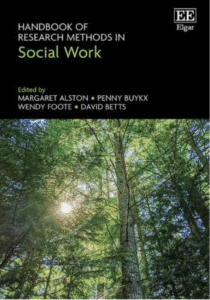Earlier this year Edward Elgar published a new Handbook of Research Methods in Social Work.

I contributed a chapter called “Documentary Analysis” with Shurlee Swain, Wendy Foote and Chris Krogh.
Here is an Abstract:
Writing is a practice as central to social work as listening. The capacity to write and the choices made when writing are dimensions of social workers’ power in relation to those with whom they work. To date, there has been limited research into social workers’ writing and written records. More recently, the case records central to social work practice are being increasingly used as sources for research.
This chapter begins by showing the position of case records in social work practice and continues with an analysis of case records as sources for research, arguing that they need to be understood as dynamic rather than static, created at a particular point in time for a particular purpose but with a long afterlife with a significant and, at times, devastating impact on those about whom they were written.
Drawing examples from their individual research projects, the authors show methods that can be used when researching documents and reflect on the factors that need to be taken into account in using case records as core data. They also set out the ethical issues involved in using such material in research and reporting research outcomes, with a particular focus on engaging with the subjects of the files, disrupting the power imbalances implicit in the documents at the point of creation, and opening up an exploration of the impact of their encounter with their documented selves.